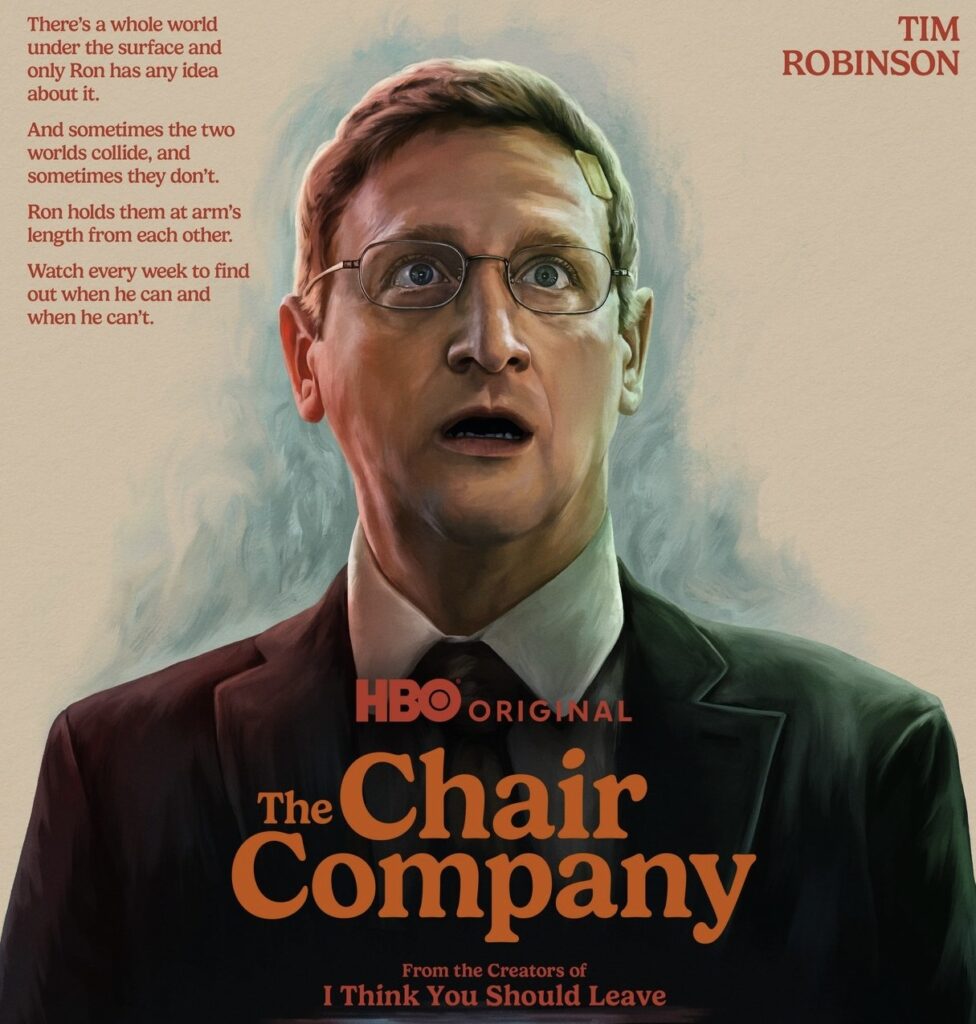The television landscape thrives on unlikely collisions. Every so often, a project emerges that feels so unexpected, so oddly fitting, that audiences and critics alike pause in anticipation. HBO’s forthcoming series The Chair Company is one such project. Anchored by the singular comic voice of Tim Robinson—best known for his sketch comedy chaos in I Think You Should Leave—the series promises to catapult Robinson into uncharted territory: the world of prestige drama-comedy television. The first trailer has finally dropped, and the buzz is electric.
With HBO’s reputation for high-brow storytelling and Robinson’s anarchic humor, The Chair Company sets out to fuse irreverence with gravitas, surreal gags with character-driven arcs. If the trailer is any indication, this may be the most audacious show of the season—a satire of corporate culture that doubles as a profound exploration of human absurdity.
Tim Robinson: Sketch Comedy’s Unlikely Prestige Hero
Tim Robinson is not the first comedian to make the leap from sketch-based absurdity to a more narrative-driven format, but his trajectory feels unique. While SNL alumni often seek mainstream success, Robinson cultivated a cult following. His breakout Netflix series I Think You Should Leave established him as a purveyor of cringe comedy—sketches where everyday situations spiral into surreal implosions of social awkwardness.
In The Chair Company, Robinson appears to retain that awkward energy but channels it through longer-form storytelling. Instead of fragmented sketches, the trailer suggests he’ll be playing a central figure navigating a crumbling corporate empire. For audiences familiar with his “too much, too soon” comedic style, the prospect of Robinson attempting gravitas—while never abandoning his absurd streak—is both thrilling and bizarre.
The Premise: Chairs, Corporations, and the Theater of Business
At first glance, the subject matter of The Chair Company feels delightfully banal. According to HBO’s teaser, the series centers on a decades-old furniture company struggling to remain relevant in the age of ergonomic startups, minimalist aesthetics, and shifting global supply chains.
The titular “Chair Company” functions as both a literal setting and metaphor: a workplace where the stakes of chair design, production, and sales are heightened to Shakespearean proportions. From the boardroom to the showroom floor, the trailer hints at a satirical examination of capitalism’s strangest corners.
Scenes in the teaser show Robinson at the head of long, glossy conference tables, flanked by humorless executives. Yet, true to form, chaos erupts in tiny details—chairs breaking during presentations, focus groups devolving into shouting matches, and one particularly striking moment where Robinson earnestly declares: “We don’t sell chairs, we sell how people sit in the world.”
This duality—mundane object meets existential weight—promises a series that is both funny and thematically rich.
HBO’s Prestige Touch: Beyond the Gags
What elevates The Chair Company beyond a workplace parody is HBO’s pedigree. Known for shaping culture with series like Succession, The White Lotus, and Industry, the network excels at dramatizing institutions. The Chair Companyappears poised to extend that lineage, treating corporate absurdity with the same gravity once reserved for family dynasties and luxury resorts.
The trailer is shot with HBO’s signature cinematic sheen: muted lighting, deliberate pacing, and moody orchestral cues. Yet woven between the serious visuals are Robinson’s unmistakable antics—awkward pauses, escalating rants, and characters who behave with surreal conviction.
This stylistic blend suggests a tonal experiment: a prestige series that doesn’t wink at its comedy but instead frames absurdity with deadly seriousness. In other words, the laughs may not come from punchlines but from the dramatic weight placed on ridiculous scenarios.
Supporting Cast: A Who’s Who of Prestige Talent
Robinson may headline, but HBO rarely builds a project around a single performer. The Chair Company boasts an ensemble cast drawn from both comedy and drama, signaling its hybrid ambitions.
- Carrie Coon plays the company’s steely CFO, a counterpoint to Robinson’s flailing CEO. Known for her gravitas in The Leftovers and The Gilded Age, Coon adds dramatic ballast.
- Mahershala Ali appears as a rival furniture mogul, whose stoic intensity transforms the chair business into a battleground of egos.
- Zoë Kravitz is introduced as a visionary designer hired to modernize the company, sparking clashes between old and new aesthetics.
- John Turturro, ever the master of weary gravitas, plays a longtime factory manager caught between loyalty and disillusionment.
Together, this cast suggests a balance of pathos and absurdity. Robinson’s manic energy is offset by performers skilled at playing sincerity, amplifying the comedy by refusing to treat it as comedy.
Themes: Chairs as Metaphor for Modern Life
The trailer invites viewers to see The Chair Company as more than satire. The recurring motif of chairs—objects designed to support, contain, and comfort—becomes symbolic of broader questions:
- Who gets a seat at the table? Power dynamics in the corporate world.
- How do we sit in society? The existential weight of roles, responsibilities, and comfort zones.
- What does a broken chair mean? Failures of structure, whether personal or institutional.
At its core, the series seems interested in how small objects and everyday rituals—like sitting—reveal the absurdity of modern life. In this way, it aligns with Robinson’s comedy, which thrives on magnifying the trivial until it becomes cosmic.
Reception to the Trailer: Excitement and Skepticism
Online reactions to the trailer highlight the polarizing nature of Robinson’s comedy. Fans of I Think You Should Leavecelebrate the prospect of his chaotic humor infiltrating HBO’s prestige space. They cite the brilliance of elevating something as innocuous as chairs into a subject of dramatic obsession.
Skeptics, however, wonder if Robinson’s energy can sustain across serialized storytelling. Will the sketches stretch thin? Can HBO’s prestige trappings coexist with Robinson’s unhinged style, or will one overshadow the other? These questions fuel anticipation, ensuring that The Chair Company will debut amid scrutiny and debate.
Comparisons: Succession Meets Sketch Comedy
To situate The Chair Company in TV’s evolving ecosystem, one might call it a hybrid between Succession and I Think You Should Leave. From the former, it borrows the language of corporate intrigue: power struggles, family drama, and ruthless competition. From the latter, it inherits absurdist humor, awkward silences, and surreal escalation.
The result could redefine what prestige comedy looks like. Instead of choosing between satire and sincerity, The Chair Company attempts both—an HBO drama that dares to be ridiculous without apology.
The State of Prestige Comedy in 2025
The emergence of The Chair Company comes at a time when prestige comedy is evolving. Series like Barry, Fleabag, and The White Lotus blurred boundaries between humor and darkness, showing that audiences crave tonal complexity. Robinson’s HBO debut suggests the genre is ready for even bolder experiments.
If successful, the show may open doors for other unconventional comedians to step into prestige spaces. Imagine sketch comics exploring corporate culture, surrealists tackling historical drama, or absurdists satirizing technology. The Chair Company could prove that the future of prestige TV lies in embracing the unexpected.
Culture
Though comically trivial, the choice of chairs as a central motif speaks to contemporary anxieties. In an age of remote work, ergonomic debates, and hyper-designed office furniture, chairs are suddenly cultural battlegrounds. They embody questions of labor, comfort, and status.
By dramatizing chairs, Robinson and HBO are not just making a joke—they are tapping into modern life’s strange priorities. A show about chairs becomes a mirror of society’s tendency to imbue ordinary objects with extraordinary meaning.
Impression
The trailer for The Chair Company leaves more questions than answers. How far will Robinson lean into absurdity? Will HBO’s prestige touch elevate or constrain his chaos? Can a show about chairs truly capture the zeitgeist?
What is clear is that The Chair Company is unlike anything else on television. It represents a gamble—a collision of comic anarchy and prestige seriousness—that could either collapse under its contradictions or soar as a new benchmark for innovative storytelling.
For now, the excitement is undeniable. Tim Robinson, HBO, and the humble chair are poised to deliver one of the year’s most audacious cultural experiments.
No comments yet.







